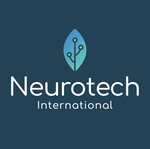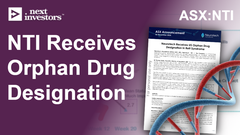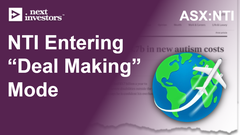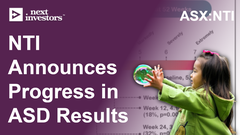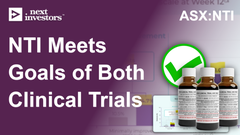FDA rejects orphan drug status for PANDAS/PANS
Not the news we wanted to hear but not the end of the world for our biotech investment Neurotech International (ASX:NTI).
Today, NTI announced the FDA declined “orphan drug designation” for children and adults diagnosed with PANDAS and PANS.
NTI now has 12 months to respond to this decision and convince the FDA that the opposite is true.
To encourage the development of treatments of rare diseases, governments provide generous incentives to companies with orphan drug designation:
- Fast Tracked Approvals: This means that the company will not always need to undertake the entirety of a Phase III clinical trial in order to get the product to market.
- Market Exclusivity: Once the US FDA grants orphan drug designation to a drug, it also gets seven years of market exclusivity.
- Orphan drug pricing: Orphan drugs are priced at a point that encourages drug developers to make treatments.
However, without orphan drug status NTI will not be able to enjoy the benefits for its treatment of PANDAS/PANS which provided promising results.
So, what happened?
In order to get approval for orphan drug status a company needs to prove that there is a very low population that has a particular condition or disease.
In fact there is a number, the prevalence needs to be less than 200,000 people in the US.
The benefits of orphan drug status are mitigated by the lack of total addressable market (and patient numbers) for a particular condition.
That’s why companies tend to target conditions that are on the borderline of that 200,000.
So that they have a patient population enough to justify a commercial product, while still achieving orphan drug designation.
According to the data we could find PANDAS/PANS affects around 1 in 200 children, however this was not considered “rare” enough by the FDA.
What happens next?
NTI now has 12 months to object to the ruling.
The company can still develop PANDAS/PANS products through the traditional pathway.
NTI is also developing treatments for three other conditions.
NTI is currently awaiting FDA approval for orphan drug status of Rett Syndrome (which we expect to come in given the Neuron receives orphan drug status).
As well, it has a clinical trial for Cerebral Palsy to gather further data.
However, the biggest blue sky (and most advanced product) is for Autism.
The final 52 week results of NTI’s Phase 2/3 trial will be published towards the end of the year, and we are eagerly anticipating whether the results improve upon the already promising data published.
Once the results are published we expect NTI either to look to commercialise the product in Australia OR take the product to the US and look for a partner to help with a larger clinical trial.
So although today’s results mean that one of NTI’s “shots on goal” have missed, there is plenty more ammunition in the chamber.
How does this news affect our investment memo?
The key risk that has materialised is “regulatory risk”.
In our investment memo we flagged that “orphan drug status” was one of the key regulatory hurdles that the company would need to pass.
As this has been rejected we see this as a hindrance for the company achieving our overall big bet.
Regulatory risk
There are a number of key regulatory hurdles that NTI will need to clear.
This includes but is not limited to IND applications with the FDA, orphan drug status, provisional approval for fast tracked commercialisation with the TGA.
There is no guarantee that these regulatory approvals will be granted and if they are rejected it will be a big setback for NTI.
Source: NTI Investment Memo

